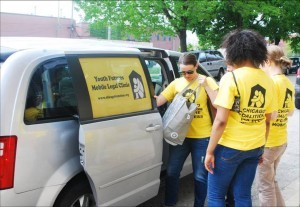By Angelika Labno, CBF Administrative & Communications Coordinator
Being a teenager already can be a struggle at times…but imagine being a homeless teenager. The constant worry of having to figure out where you’ll sleep that night is a fraction of your worries. Imagine struggling to stay in school because you’re doing homework on a couch in your friend’s noisy living room. Imagine breaking your leg but not having the legal identification records needed to get medical attention.
Homeless youth need someone to fight for their basic rights to overcome these challenges, and your support of the Investing in Justice Campaign is helping to make that possible.
More than 22,000 homeless students were identified by Chicago Public Schools during the 2013/2014 school year. Many of them faced issues with education, such as school enrollment, residency, fee waivers, and access to special education, tutoring, or transportation. They confront a plethora of civil issues, too, including food stamp appeals, social security, family law, and access to healthcare.
“These are complex legal issues they face, and often times they have no place to turn to understand what their rights are,” said Patricia Nix-Hodes, Director of the Law Project for the Chicago Coalition for the Homeless — a project you are helping to support through the Campaign. “Given their circumstances, it can be difficult to access legal service, so we try to be a gateway for these kids to get legal resources.”
In 2004, a CBF-sponsored Equal Justice Works Fellow started Youth Futures, a mobile legal aid clinic for homeless youth through the Law Project at the Coalition for the Homeless. It is the only project in Chicago that provides dedicated legal services to homeless and unaccompanied youth, with attorneys assisting about 200 clients a year. Associate Director and Youth Futures Attorney Beth Cunningham, who has been with the program since 2007, conducted outreach to more than 1,100 youth last year and offered 20 legal aid clinics at 10 CPS high schools with high homeless enrollments. Also in the last year, CCH legal staff ran 26 professional trainings on educational or youth issues for 1,665 attorneys, school staff, and social workers; and 27,800 flyers, brochures, posters, and door hangers were distributed through street outreach to more than 100 venues such as churches, stores, and social service groups.
“There’s been a lot of good progress made in terms of resources, but there is still such a huge service gap—so many young people are turned away every day,” said Cunningham, noting a need for funding for youth-specific housing and services.
Youth Futures strives to make its services as accessible as possible for a hard-to-reach population. Attorneys and volunteers travel by van to locations throughout Chicago communities and offer weekly outreach in school and street programs, homeless shelters, and drop-in centers. These include the Center on Halsted, La Casa Norte, and Teen Living Programs. In July 2014, Youth Futures added cell phone texting for easier communication. Most recently, Youth Futures came out with a Homeless Youth Manual with the help of attorneys from Baker & McKenzie and United Airlines. The manual, which is available in print and online editions, outlines legal rights and resources and is intended to be a comprehensive tool for youth and professionals working with youth. Its topics range from complex legal information to something as practical as obtaining a birth certificate or state ID, and a glossary breaks down legal jargon in easy-to-read terms.
Cunningham and her colleagues working on Youth Futures also handle cases and lead policy efforts impacting homeless youth. Cunningham has bolstered Youth Futures’ advocacy work in recent years, particularly with her recent position as co-chair on the Education Committee of the Chicago Task Force on Homeless Youth. Youth Futures secured an amendment to the Minors Consent to Medical Procedures Act, which allows unaccompanied minors, ages 14 to 18, to consent to their own non-emergency medical care. Authored by Equal Justice Works Fellow Graham Bowman and put into effect October 1, 2014, the law is projected to help more than 7,000 unaccompanied minors in Illinois each year. Graham and Cunningham will continue to research and pursue legislation on managed care, care coordination, and access to care.
“We’re moving in a positive direction,” Cunningham continued. “We’ve been able to tailor the work that we do and the different target outreach sites that we visit depending on the needs of the youth.”
During Cunningham’s first year at CCH, she met a 16-year-old pregnant girl at a high school. She had been kicked out of her home and was struggling to access benefits for herself and her unborn child. Cunningham’s advocacy was successful in securing medical and other assistance for the two of them. The girl came back for help in re-enrolling in school, and again with a housing issue a little while later. And each time, the legal help she received empowered her to stay on track amidst challenging circumstances, and she did that and more. She was honored at a CCH event last year when she graduated from college, which she was able to help pay for with a scholarship from CCH.
“Her life is a lot different than when we first met her,” said Cunningham. “Even if you had a small role in that, you’re providing something valuable and needed. Through people like her, it’s apparent to us that our services are needed and appreciated.”

